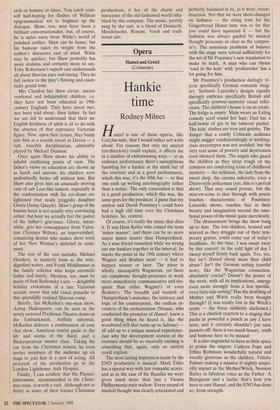Opera
Hankie time
Rodney Milnes
Hansel is one of those operas, like Cosi fan tutte, that I would rather not write about. For reasons that only my analyst (ex-directory) could explain, it affects me in a number of embarrassing ways — at an ordinary performance there's surreptitious fumbling for a hankie at the ninth bar of the overture and at a good performance, which this was, it's the fifth bar — so that one ends up writing autobiography rather than a notice. The only consolation is that in a good production, which this was, the same goes for the producer. I guess that my analyst and David Pountney's could have had a high old time over the Christmas holidays. So, control.
Of course, it's really the music that does it. It was Hans Keller who coined the term `minor master', and there can be no more major minor master than Humperdinck. As a wise friend remarked while we wrung out our hankies together in the interval, he marks the point in the 19th century where Wagner and Brahms meet — it had to happen sooner or later. The piece is wholly, inescapably Wagnerian, yet there are symphonic thought-processes at work more immediately communicative and elo- quent than either Wagner's or even Brahms's. The breadth and warmth of Humperdinck's melodies, the intricacy and logic of his counterpoint, the endless in- vention of his orchestration (Strauss, who conducted the premiere of Hansel, knew a good thing when he heard it, like the woodwind trill that turns up in Salome) all add up to a unique musical experience. Just why the development section of the overture should be so viscerally exciting is something that, again, only an analyst could explain.
The most lasting impression made by the ENO production is musical. Mark Elder has a special way with late romantic scores, and as in the case of his Rusalka we were given much more than just a Vienna Philharmonic-style wallow. Every strand of musical thought was clearly articulated and perfectly balanced in its, as it were, recon- struction. Not that we were short-changed on lushness — the string tone for the Gingerbread House tune was so fat that you could have squeezed it — but the lushness was always guided by musical thought processes as clear as the compos- er's. The notorious problems of balance with the stage were solved sufficiently for the wit of Mr Pountney's new translation to make its mark. A man who can rhyme `toad in the hole' with 'profiteroles' has a lot going for him.
Mr Pountney's production daringly re- jects specifically German romantic imag- ery. Stefanos Lazaridis's designs equally daringly embrace specifically British and specifically postwar-austerity visual refer- ences. The children's house is on an estate. The fridge is empty. Mum wears an Ealing comedy scarf round her hair; Dad has a half-bottle of gin in his raincoat pocket. The kids' clothes are torn and grubby. The danger that a comfy Coliseum audience might snigger condescendingly at working- class stereotypes was not avoided, but the very real sense of poverty and deprivation soon silenced them. The angels who guard the children as they sleep rough on the common are comforting icons of childhood memory — the milkman, the lady from the sweet shop, the cinema usherette, even a Dixon-style policeman (yes, this is a period show). That may sound prosaic, but the mice-en-scene is shot through with poetic touches characteristic of Pountney/ Lazaridis shows, touches that in their beauty and imagination second the emo- tional power of the music quite mercilessly.
The denouement brings the show bang up to date. The lost children, bruised and scarred as they struggle out of their tem- porary graves, could come out of today's headlines. At the time, I was swept away by this conceit; in the cold light of day I sweep myself firmly back again. Yes, yes, but isn't Hansel about more than child abuse? Isn't the German setting (careful now), like the Wagnerian connection, absolutely crucial? Doesn't the power of the work, with all its implications, emerge even more strongly from a less specific, even fairy-tale setting? Has the doubling of Mother and Witch really been thought through? (I was totally lost in the Witch's scene — the focus suddenly slackened.) This is a churlish reaction to a staging that packs as powerful a punch as any I have seen, and it certainly shouldn't put sane punters off: there is too much beauty, truth and humour here to be missed.
It is also ungrateful to have so little space to praise the singers: Cathryn Pope and Ethna Robinson wonderfully natural and vocally generous as the children, Felicity Palmer making a massive if slightly unspe- cific impact as the Mother/Witch, Norman Bailey in fabulous voice as the Father. A Brangaene and a Sachs: that's how you have to cast Hansel, and the ENO has done so, from strength.










































 Previous page
Previous page